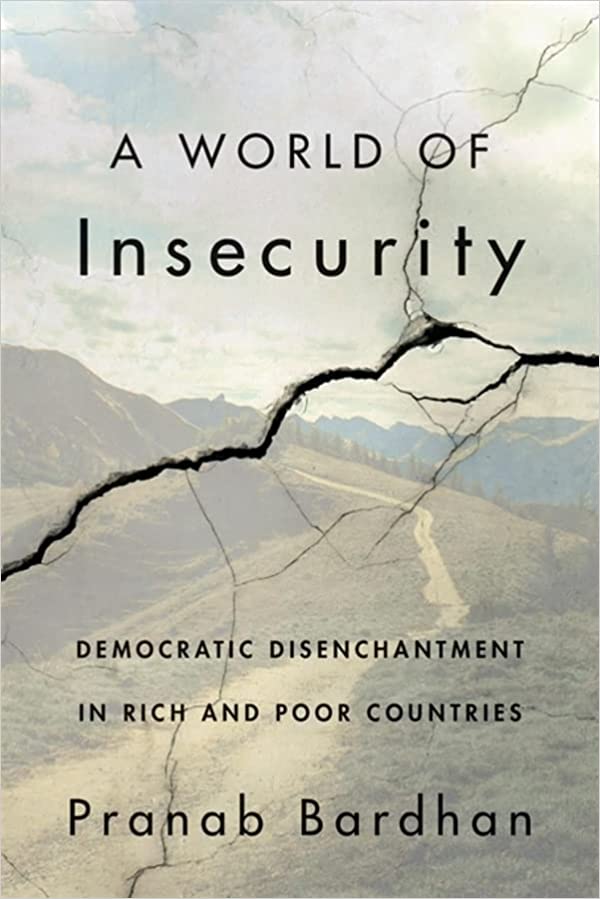
The starting point of a World of Insecurity is that democracy is under threat across the world and that this threat comes from the acts of elected governments themselves and, particularly, from the rise of populist governments. This is becoming a common theme (see, for example, The Economics of Belonging. Bardhan, however, suggests that his book is different in some major ways: first, his analysis seeks to combine “the perspectives of rich industrial countries and relatively poor developing countries” (page 3); secondly, he seeks to examine not only “the large rise in inequality” but also the “distinctive problems of insecurity, both economic and cultural” (page 3); and, thirdly, he assesses what he describes as “the alternative model of authoritarian capitalism” adopted in China (page 4).
Although Bardhan’s book is not as different from others as he may believe, he sometimes brings a different perspective to problems and there is much in his analysis that is interesting. It is refreshing to read a book that avoids treating the economic problems of the West (and, in particular, those of the USA) as if they were the problems of the world and both Bardhan’s frequent references to Indian issues and his chapter analysing the Chinese experience are valuable. Furthermore, his broader perspective enables him to adopt a more nuanced approach to some policy proposals that are frequently advanced. For example, his analysis of the idea of devolving more power to local communities draws heavily on the Indian experience to present challenges to those in the West who are guilty of “communitarian romantism” (page 39); his suggestion that universal basic income may be more affordable in some middle-income countries than it is in high-income countries is worthy of consideration; and his observation that “Support for globalisation is stronger in developing than developed countries” (page 18) should give food for thought to all those who see globalisation as one of the main causes of the world’s woes.
Bardhan rightly urges that we “move beyond the overly simple and amorphous Left versus Right distinction of common ideological parlance” on the basis that it “has become quite misleading, particularly in failing to capture the multidimensionality of ideological positions” (page 102). He recognises that many so-called “right-wing” populists advocate social policies that are more commonly associated with the Left and that there are considerable divisions within both those who would regard themselves on the Left of the political spectrum and those who would regard themselves as on the Right. He himself is not easily categorised since, although he advocates many policies associated with the Left, he broadly favours free trade.
He recognises both the need to bridge ideological and social divides and that, in the kind of democracy that he favours, there will always be significant differences of opinion and, therefore, a need to compromise. He also urges that Social Democrats keep in mind that “their strength ultimately lies not in fighting battles on new frontier of identity puritanism but in finding ways of transcending the divisions of society based on identity” (page 131).
All of this is valuable but, sadly, overall the book promises more than it delivers and, as it progresses, its defects come more and more to the fore.
Despite the reasonableness of some of his statements, in many places, he uses disrespectful and dismissive language in relation to people and ideas with whom or which he disagrees. Examples include his reference to “the bullying shambolic showman Boris Johnson” (page 27), his statement that the Republican Party in the USA is “serving the interests of the business elite, whilst stoking culture wars to consolidate party votes among socially conservative lower classes” (page 30), his division of “the Right” between “greed-is-good market fundamentalists, on the one hand, and conservatives on the other, who dread the encroachments of the market on traditional family values and community dislocations” (page 114) and his gratuitous reference to “Thatcherite depredations” (page 142). Whether or not one agrees with his underlying concerns (and some clearly have an element of truth in them), this kind of language is unhelpful.
Furthermore, despite his recognition of the inadequacy of the left-right distinction, Bardhan uses it himself and leaves us in no doubt as to where his sympathies lie. For example, his comments about “closed ideological echo chambers” are directed solely at “right-wing populists” (page 130) and, although he rightly points to the toxic role of social media, he wrongly reserves his denunciation for “the right-wing troll armies”, which he believes “have been much more effective in spreading their message than the Left has been in countering the damage and spreading its own message” (page 31). Those who have been the victims of trolling by reason of their views on transgender issues and other controversial subjects and others who have been “no platformed” on account of their rejection of left-wing shibboleths will doubtless beg to differ.
Bardhan never states clearly who his target audience is. Although frequent reference is made to the research and views of other academics, A World of Insecurity is not an academic work: it has no footnotes or endnotes and many of its arguments are lacking careful support. Yet it is not the kind of book that will attract casual readers, let alone one that is likely to persuade many people to change their basic political positions. One, therefore, gains the impression that Bardhan is writing primarily for those on the Left who are in search of a programme and this impression is enforced by his tendency, particularly in the second half of the book, to speak about what “Social Democrats” should and should not do.
Some of his comments read as though they were made by a political campaign manager seeking to establish a platform for an election (e.g. “in order to differentiate its products from those on the right, social democrats have to be innovative not just ‘redistribution’ but in the sphere of production or what is sometimes called predistribution”, page 122). Furthermore, despite the devotion of a full chapter to universal basic income and adequate discussion of some other policy matters, as the book progresses, Bardhan’s policy suggestions come thick and fast and he asserts things as if they were self-evidently true and thus not needing any supporting argument (e.g. “Of course, the need for redistribution will be pressing as the pandemic exacerbates the forces of inequality in manifold ways”, page 122). The reader may thus be left with the same kind of unsatisfactory feeling that accompanies the reading of a party’s election manifesto in which the list of vague and undeveloped policy commitments leaves more questions than answers.
Some of Bardhan’s statements are extraordinary. In a throw-away comment, he states that “high tax rates on capital have the additional benefit of discouraging investment in labour-displacing automation” (page 153). Presumably he would have supported such taxes to prevent the introduction of textile machinery at the end of the eighteenth and beginning of the nineteenth centuries! He also seems to regard China’s handling of the Covid pandemic as a success story (page 64) and his suggestion that “the duality of employment opportunities in the American economy gets layered into the history of racial politics to perpetuate the rich and poor class divide as the middle vanishes” is, at best, in need of substantial qualification. The latter statement is, in any event, surprising from someone who wishes to take a global perspective and who is presumably aware that, on a global level, inequality has diminished rapidly over the past generation primarily as a result of the poor moving into “the middle”.
The defects in A World of Insecurity are disappointing because, with a less ideologically partisan approach, it could have been very interesting. As it is, those looking for a left of centre political programme that focuses on the current feeling of economic insecurity (albeit from a purely US perspective) would be better off reading The Wolf at the Door.
“A World of Insecurity: Democratic Disenchantment in Rich and Poor Countries” by Pranab Bardhan was published in 2022 by Harvard University Press (ISBN-13:9780674259843). 206pp.
 Richard Godden is a Lawyer and has been a Partner with Linklaters for over 30 years during which time he has advised on a wide range of transactions and issues in various parts of the world.
Richard Godden is a Lawyer and has been a Partner with Linklaters for over 30 years during which time he has advised on a wide range of transactions and issues in various parts of the world.
Richard’s experience includes his time as Secretary at the UK Takeover Panel and he is currently a member of the Panel. He also served as Global Head of Client Sectors, responsible for Linklaters’ industry sector groups, and was a member of the firm’s Executive Committee.